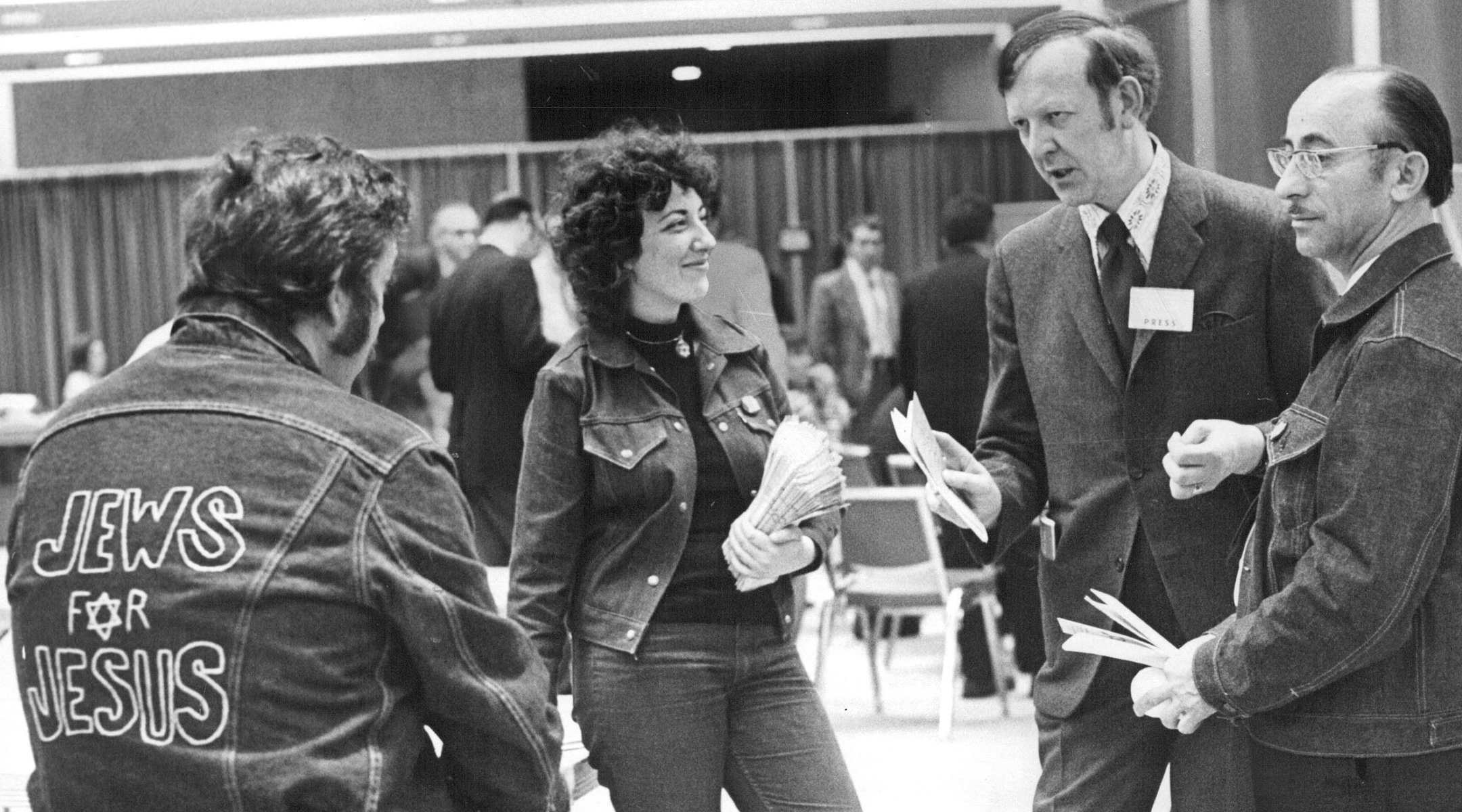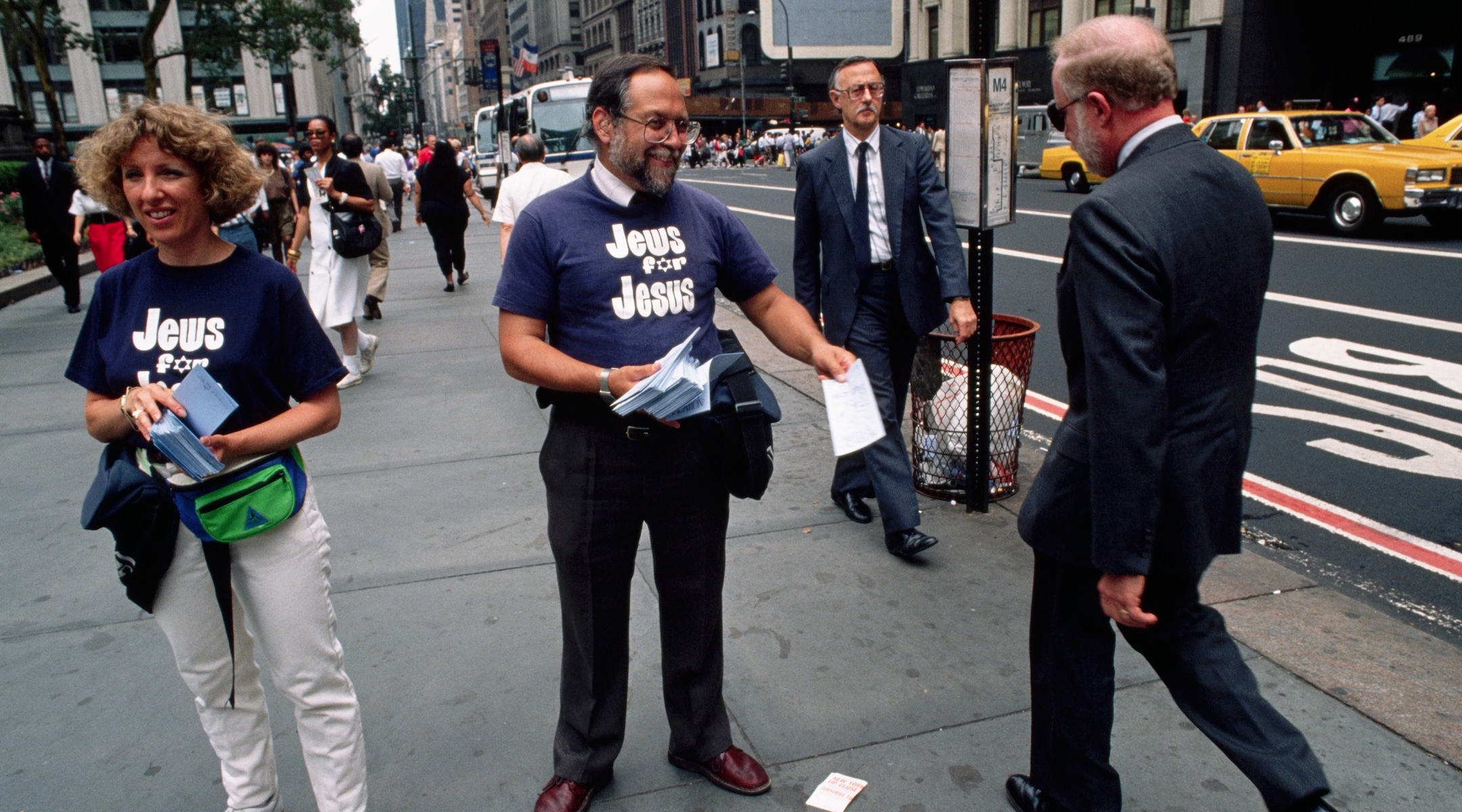With a new leader and revamped strategy, it’s a second coming for Jews for Jesus
Jews for Jesus has shifted a lot of its focus to Israel, where it now has 60 staff members. The organization’s new CEO, Aaron Abramson served in the Israeli army

Aaron Abramson has taken over as CEO of Jews for Jesus, the third leader of the group and the first with an Israeli background, replacing David Brickner who led Jews for Jesus since 1996. (Courtesy of Jews for Jesus)
Aaron Abramson’s American upbringing is apparent when he speaks Hebrew, the language he learned as a teenager after his hippie parents decided to move the family from Seattle to Israel and become religiously Orthodox.
His subsequent army service didn’t erase the accent, but it did solidify an Israeli identity that would serve as a professional asset much later, decades after he stopped living in the country.
This month, Abramson, 49, takes the helm as the CEO of Jews for Jesus, becoming the third person to hold the title since the controversial organization was founded in San Francisco some five decades ago. He is also the first Israeli to lead the organization, a point emphasized in the group’s announcement of his appointment.
Abramson’s rise makes him a prominent new face of a perpetual Christian missionary effort aimed at converting Jews into belief in Jesus as the Messiah. After serving on staff for years, he takes over an organization that, without much notice from the Jewish community, has grown into a global operation with a budget of more than $33 million and a staff of about 250 spread across 13 countries.
No denomination across the Jewish world sees belief in Jesus as compatible with Judaism — a rare point of consensus between the religious streams. But so-called “Messianic Jews” insist that they represent a legitimate form of Jewish identity, almost like another denomination in itself.
The selection of a leader with Israeli bona fides underscores how Jews for Jesus has evolved from its founding as part of the counterculture of the early 1970s. Led back then by founder Moishe Rosen, a Jew who converted and became an ordained Baptist minister, Jews for Jesus was known for theatrical street evangelism and distributing provocative religious literature in New York and other American cities with large Jewish populations.
Today, the largest concentration of Jews for Jesus staff is in Israel, where the group employs some 60 people. The staff aren’t on the streets handing out tracts, even though proselytizing is legal in Israel as long as the targets are not minors and it isn’t in exchange for money. Instead, they say they focus on providing assistance to those in need and support to new immigrants, struggling soldiers, victims of trafficking and the homeless. Messianic teachings come on the side for those who may be interested. Other Messianic Jews in Israel have sought to serve up the gospel alongside coffee and pastries.
It’s an approach Jews for Jesus has also used in the United States, where its staff seek out Holocaust survivors in need, and in Europe, where they have been involved in Ukraine relief efforts amid massive displacement that also affects the country’s Jewish community. Other Messianic groups also work in Ukraine.
“At some point, about 10 to 15 years ago, we started to pivot away from the campaign model,” Abramson, who sports a short graying beard, said over Zoom from his home in London. “We don’t stop our work just because there’s opposition, but we wanted to create avenues for Jewish people to dialogue around who Jesus is and what it means to be a follower of Jesus.”
According to Abramson, the organization has talked to some 40,000 Jews about Jesus over the past year and is aware of about 250 people who became “Jewish followers of Jesus,” a term his movement prefers over phrases like Jewish Christians or Jewish converts to Christianity. They also deliver 100-150 copies of the New Testament in Hebrew every month to people who fill out a request for one online, Abramson said.
Jews for Jesus doesn’t operate congregations. Instead, it refers converts to traditional churches and to houses of worship affiliated with the larger “Messianic Jewish” movement. Abramson and family attend an Anglican church in London.
In parallel to its direct outreach to Jews, the group also speaks to church audiences about Jews and Judaism. Abramson says this work serves to clarify misconceptions that Christians may have and helps the fight against antisemitism. Evangelical Christians have in turn lavished donations on the group and allowed it to expand. Financial statements provided by Jews for Jesus show a 2023 budget of about $33 million, which is roughly three times as much as the United Synagogue of Conservative Judaism, an organization representing an entire Jewish denomination.

From left are Moishe Rosen (back to camera) and Jean Emma; at right is Eliezer Urbach. The three talk with unidentified man at a meeting of American Baptist Convention in Denver, Colo., on May 12, 1972. (Denver Post via Getty Images)
Opposition to Jews for Jesus and the Messianic movement used to be a major priority for many Jewish leaders back when the group engaged in provocative public campaigns, which is why a stir erupted last year when the Jewish Telegraphic Agency published an article based on newly surfaced FBI records showing that some Jewish leaders secretly collaborated with Jews for Jesus in the 1970s. Today, outrage over missionary tactics calibrated to appeal to Jews is still strong among a dedicated few.
“Jews for Jesus is the most well-known organization targeting Jewish people worldwide in a Jewish-y way,” said Shannon Nuszen, a former Christian missionary who converted to Judaism and then founded the anti-missionary group Beyneynu in Israel. “Their tactics are deceptive and meant to lure Jews using Jewish traditions, symbols, and icons — Jews who would otherwise resist a straightforward honest presentation.”
Rabbi Tovia Singer, an American Jewish immigrant to Israel, has been tracking the movement for more than 40 years. His group, Outreach Judaism, runs social media accounts dedicated to countering Messianic narratives. He sees Jews for Jesus’ turn to humanitarian work as opportunistic and pernicious.
“Jews for Jesus are still a fig leaf for the Christian mission to the Jews,” Singer said. “They use humanitarian aid in order to reach the most vulnerable members of the Jewish community and because they realize that handing out tracts in New York helped raise money but it was not effective in evangelizing Jews.”
In the past, many Messianic missionaries may have responded to Singer with a defense of their faith, but there’s a new attitude about critics, according to Richard Harvey, a former leader in Jews for Jesus and a scholar of the movement.
“Jews for Jesus started as a simple protest, saying that you can be Jewish and believe in Jesus, and that we believe this, not because we’ve been brainwashed or blackmailed or bribed, but because we’ve had a genuine spiritual experience,” Harvey said.
From his perspective, skepticism faced by the early iterations of Jews for Jesus was a relic of historic tensions in Christian-Jewish relations and isn’t very widespread today.
“We really have moved on,” he said. “Today, it’s less of an us-and-them situation with the Christian and Jewish communities because Jewish communities are so pluralistic and varied anyway. And meanwhile, so many Christians have really reviewed and changed their understanding of the Jewish people.”
Abramson, who studied under Harvey as an undergraduate at All Nations Christian College in the United Kingdom, has a life story that encapsulates how blurred the lines of religious identity can be.
His father came from a Reform Jewish family in Detroit but drifted away from tradition and became a hippie together with Abramson’s mother, who was raised Catholic. Abramson, the eldest of 6 children, describes his family as marginally involved in Jewish life and almost entirely secular when he was young.
As he was approaching bar mitzvah age, the family was deciding how to mark the rite of passage, and his mom insisted that her religious tradition be represented — so the family opted to celebrate the ritual at a nearby Messianic congregation, where worshippers uphold Jesus as the messiah while also observing Jewish holidays and services.
His parents didn’t stick with Messianism. Spiritual seeking took them in a different direction instead. They had taken a trip to Israel and in 1990 decided to move the family there and to become Orthodox Jews. (His mother converted to Judaism at this time.) They lived in the Israeli settlement of Halamish in the West Bank and enrolled Abramson in a yeshiva, or religious school. Afterward, he served in the Israel Defense Forces in a non-combat role across the border during Israel’s occupation of southern Lebanon.
The years after he moved to Israel, especially his time in the yeshiva, left Abramson disillusioned with his identity and heritage.
“It made me kind of go, ‘I don’t know what I’m doing here? Why am I staying in Israel? This is crazy,’” he recalled. “People in the yeshiva seemed extreme and intense to me. Also, the experience left me without adequate answers to some of my deepest questions like, what does it mean to be Jewish? Why does God want us to keep all these laws? What is he going to do with the other 6 billion people around the world who aren’t Jewish?”
After finishing his military service, Abramson decided to pack up and return to the United States where he became something of a vagabond, traveling around with friends and playing music. He spent a lot of time reading about spirituality, picking up books on the Hare Krishna movement and New Age philosophies. Then, someone suggested he look at the New Testament.
“It just resonated,” he said. “ It seemed true to me and I even felt like I had some supernatural experiences.”

Two representatives of Jews for Jesus hand out pamphlets to pedestrians in Chicago, Aug. 9, 1990 (Jacques M. Chenet//Corbis via Getty Images)
The epiphany helped heal the rupture he had felt and ultimately led him to return to Israel and to fall in with what was at the time a very small Messianic community.
“It gave me a heart again for Jewish people and even the Orthodox community,” Abramson said. “It was funny and in a roundabout way, the New Testament made me appreciate my Jewish identity.”
There are no hard statistics about the numbers of Israeli Jews in the movement but one widely circulated estimate puts the total at 30,000, spread across several hundred congregations. Just like other small communities that are seen as marginal and out of place in the Jewish state — African Hebrew Israelites for example — Messianic believers have to an extent managed to blend into society by sending their children to the military.
Soon after Hamas’ Oct. 7 attack on Israel, a video surfaced of an Israeli soldier who identifies as a Jewish missionary who loves Jesus and tells the camera that he’s heading to the base with evangelism in mind.
For anti-missionary activists, such videos point not to peaceful integration but to the ubiquity of dangerous Christian propaganda, which they have traced to army bases, bomb shelters, and hotels housing Oct. 7 evacuees.
“Missionaries are boasting about how this is the perfect time to reach Jews,” Nuszen said. “Jews are seeing Christians delivering care packages and equipment — it’s a beautiful and heartwarming image, but Jews rarely see the videos being sent to the Christian world where they openly discuss how this support is being used to bring people to Jesus.”
Abramson doesn’t envision any significant departure from the movement’s strategy of recent years. As the director of operations for the previous leader, David Brickner, Abramson was instrumental in shaping the organization as it stands today.
He said he wants Jews for Jesus to play a larger role in raising awareness among Christians about rising antisemitism.
“We have an opportunity to advocate on behalf of Jewish people and on behalf of Israel to make allies against antisemitism because sometimes the church doesn’t exactly realize what’s going on with antisemitism,” he said.
He is also paying close attention to changing demographic patterns such as the movement of Jews from Ukraine to Israel and of Israeli Jews to the United States, and to diversity within the Jewish community, as he thinks about how to boost Jews for Jesus’ effectiveness.
“We have pivoted from a one-size-fits-all approach,” he said. “We’re going to continue to lean into very tailored, very concentrated approaches based on the needs of individual communities.”
This article originally appeared on JTA.org.















